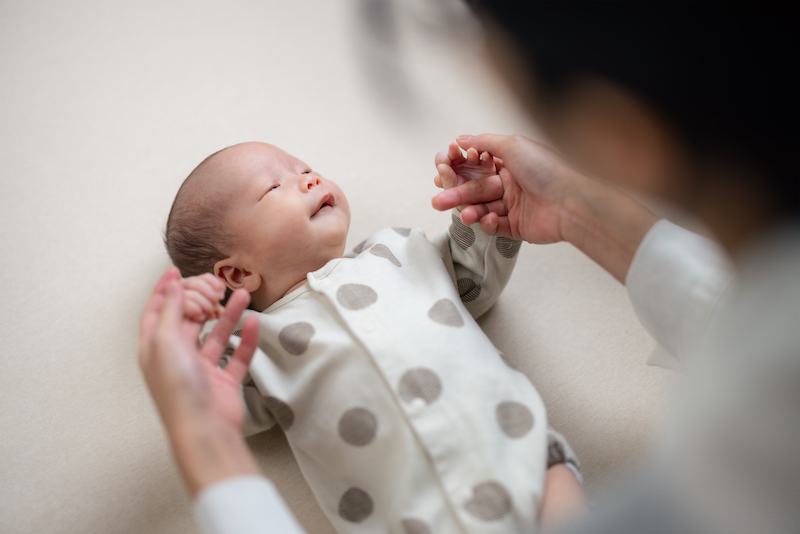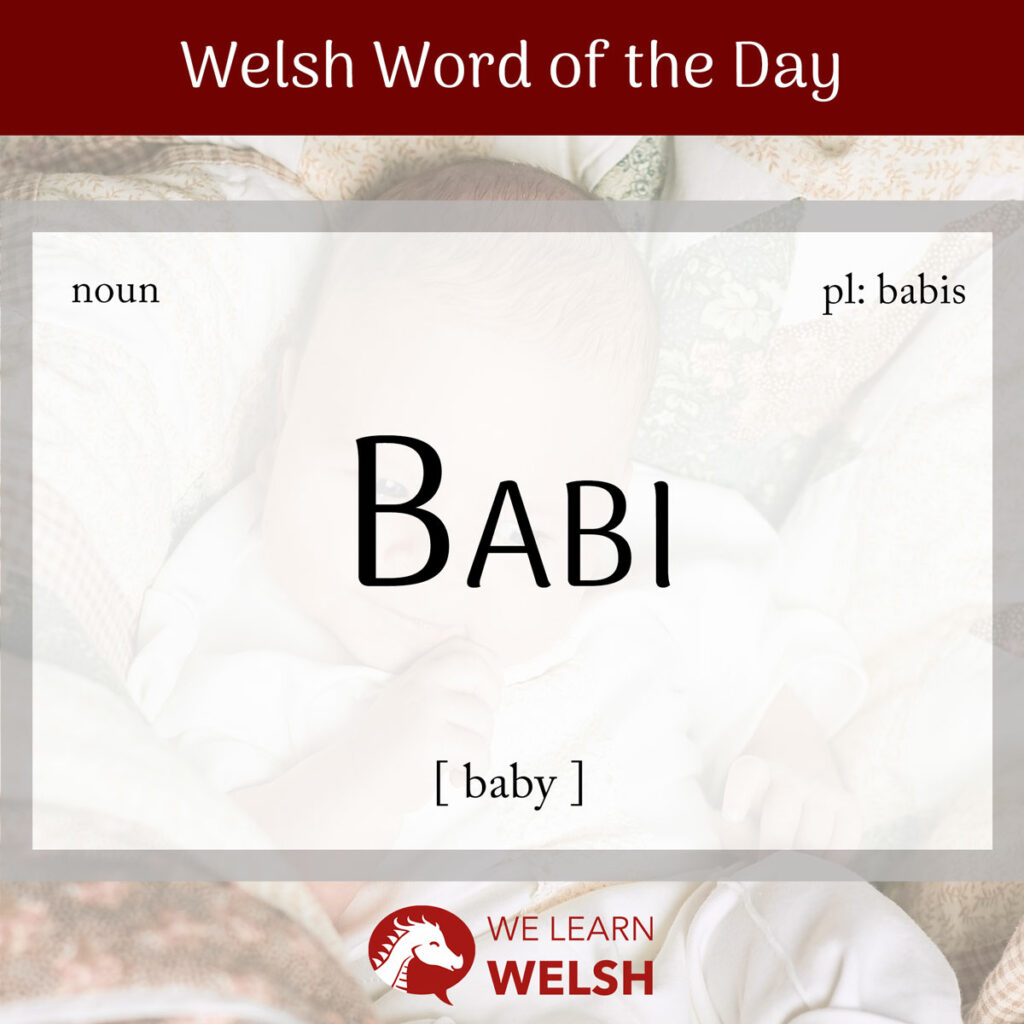Today’s Welsh word of the day is babi, which means a baby. It’s a masculine noun – most nouns describing kinds of people tend to default to the masculine in Welsh –which pluralises to babis (babies).
babi
baby
Babi is really a variant on baban, an older and more formal version form of the word. The plural form of baban is babanod. People generally just use babi and baban interchangeably, so you’ll come across both and we’ll discuss both in this article.
The word baban is the Cornish for baby, too. And it actually existed in Middle English, which is how it found its way into Welsh. Further back, it comes from the Old English baba (a male child). So the words baby, babi and baban all originate from the same root.
Another slight variation that you might come across is that some Southerners pronounce the word like this:
There aren’t any synonyms, and there’s no direct translation for infant. People would either say baban, babi, or plentyn bach (small child).
Babi is subject to two kinds of mutation, the soft and the nasal.
Soft mutation
fabi
Nasal mutation
mabi
Aspirate mutation
N/A
The soft mutation could come up in phrases like mae gen i fabi (I have a baby) or dau fabi (two babies). The nasal mutation would show up as fy mabi (my baby). Interestingly, maban also used to be a variation of baban more generally, but it is now archaic outside of the context of mutation.
Another interesting way to use this word is to transform it into an adjective. Babïaidd means babyish. Some people might say babanaidd, but it sounds a bit convoluted.
You could also call someone a babi mawr (big baby) or hen fabi (old baby), which are both more common in Welsh than literally translating cry-baby. If someone is acting like a babi mawr, it might be because someone has been babïo (babying) them.
Dw i’n poeni’n fawr. Roedd y babi ‘na’n ots o welw.
I’m really worried. That baby was very pale-looking.
Before being born, babis start out as embryonau (embryos) within the groth (womb). They are called ffetysau (foetuses) after wyth wythnos (eight weeks) of beichiogrwydd (pregnancy). Some people use the word babi from the point of beichiogi (conception), while others wait until later into the beichiogrwydd or even until geni (birth).
When they are newydd-anedig (newborn), babis (babies) spend most of their time cysgu (sleeping) and crio (crying). They may cysgu for up to eighteen oriau (hours) a day! But this is in short bursts because they need regular bwydo (feeding).
Crio in particular is often very hard to deal with for rhieni newydd (new parents). Health services recommend canu (singing) to them, cwtsio (cuddling) them and siglo (rocking) them in order to ei dawelu / ei thawelu (calm him down / calm her down), but everyone knows it’s not as simple as that!
Mae’r babi’n chwarae gyda’i thegan.
The baby is playing with her toy.
Their favourite activities are sugno (feeding) and looking at and touching their rhieni (parents). Though I’ve translated sugno as feeding, it literally means sucking – on the bron (breast) or potel (bottle) to get llaeth / llefrith (milk).
So rhieni newydd have to do all sorts:
- bwydo’r babi = feed the baby
- dal y babi = hold the baby
- cwtsio’r babi = cuddle the baby
- chwarae gyda’r babi = play with the baby
- ymolchi’r baby = wash the baby
- tawelu’r babi = calm the baby
- hala’r babi i gysgu = send the baby to sleep
- newid cewyn = change a nappy
- paratoi potel = prepare a bottle
At around pedwar neu phum mis (four or five months), babis will usually start to gain more skills, such as touching and grabbing their traed (feet), or getting better at supporting their own pen (head). By wyth mis (eight months) they’ll be showing signs of eistedd (sitting).
Dw i am addurno stafell y babi.
I want to decorate the baby’s room.
Cerdded (walking) and siarad (talking) are some of the most important camau datblygu (developmental milestones) that a babi undergoes, and often mark the datblygiad (development) into being considered a toddler.
There’s a whole host of slang words for a very little plentyn (child) or toddler in Welsh used in different parts of the country. Ask around in your local Welsh-speaking community and see what people come up with! I used to call my little brother a twdlyn.

The human ymenydd (brain) is programmed to find babis very ciwt (cute), to encourage us to gofalu (care) for them and to have our own, aiding the atgynhyrchiad (reproduction) of the species.
These kinds of emotional reactions tend to extend to anifeiliaid (animals), too – hence why we generally find a ci bach (puppy) cuter than an adult ci (dog) and a cath fach (kitten) cuter than an adult cath (cat).
Dw i’n teimlo’n flinedig ofnadwy – dw i newydd gael babi.
I’m feeling exhausted – I’ve just had a baby.
However much we caru (love) and dwlu ar (dote on) babis, as discussed, they are also a lot of hard work! And you never know when you’re going to need to clean up chŵyd (sick) or newid cewyn (change a nappy). That’s probably why both English and Welsh have the expression mor ddi-ddal â phen-ôl babi (as fickle as a baby’s bottom).

